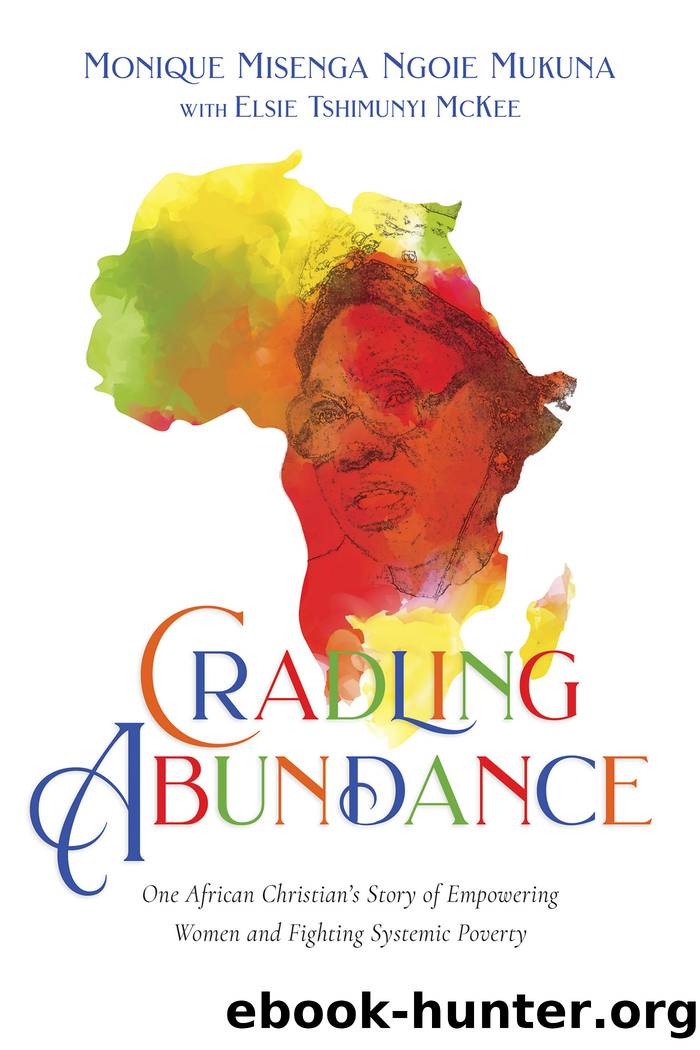Cradling Abundance by Elsie Tshimunyi McKee & Monique Misenga Ngoie Mukuna

Author:Elsie Tshimunyi McKee & Monique Misenga Ngoie Mukuna
Language: eng
Format: epub
Tags: Biography;autobiography;memoir;Majority World;African women;Democratic Republic of Congo;women in Africa;African nonprofit;maman Monique;women church leaders in Africa;women leaders in the majority world;female empowerment;leadership;sexism;violence against women;rape;poverty;microfinance;nonprofit;community;ancestry;war;Zaire;ecumenical;World Council of Churches;patriarchy;African matriarch;Femme Berceau de l'Abondance;Woman Cradle of Abundance
Publisher: InterVarsity Press
Published: 2021-06-01T10:45:40+00:00
10
Consciousness-Raising
The Founding of Woman, Cradle of Abundance / FEBA
SINGING AND DRUMMING start the gathering, and Maman Mianda dances as the monthly meeting begins. Ululating voices carry the exultant sound of praise to God. A member of the congregation prays spontaneously, passionately, and all say âAmen.â There is more singing. Then Maman Mianda reads the Scripture, and I begin to preach on Mary and Martha (Luke 10:38-42). What Mary chose was essential: listening to Jesus, staying close to him, having the gospel transform her life. But Marthaâs work was necessary also: the hungry must be fed, and children and widows must be cared for; there are many tasks to do to serve Godâs people. We must cling to Jesus for our hope and joy and abundant life, and we must also use our gifts to serve God faithfully and share life abundant with others. After the teaching, each person comes forward with singing and drumming to bring her âleast coinâ to contribute to the ministry of helping other women.
Worship and fellowship overflowing into education and action: this perspective of wholeness characterizes our nonprofit. Woman, Cradle of Abundance / Femme, Berceau de lâAbondance (FEBA for short), began as a movement, an ecumenical womenâs movement. We would come together to pray and hear inspiring lectures on different issues to educate women; it was a kind of consciousness-raising. But the women brought their practical problems, and that revealed other needs. So we transformed our organization into a nonprofit to seek means to support the women in their poverty of all kinds. At first we focused on practical forms of work that would complement what our church programs were already doing. When we began the second phase of FEBA in 2010, we expanded to meet other unmet needs.
Meeting with women from around the world in Harare, seeing how other African women organized nonprofits, gave those of us from the D. R. Congo a new vision. Each of us was already active in her own way and through her church, but we realized that we could do much more if we had an independent organization. And so, despite resistance, we set about creating one.
Download
This site does not store any files on its server. We only index and link to content provided by other sites. Please contact the content providers to delete copyright contents if any and email us, we'll remove relevant links or contents immediately.
Machine Learning at Scale with H2O by Gregory Keys | David Whiting(4313)
Never by Ken Follett(3957)
Harry Potter and the Goblet Of Fire by J.K. Rowling(3859)
Fairy Tale by Stephen King(3399)
Unfinished: A Memoir by Priyanka Chopra Jonas(3391)
The Man Who Died Twice by Richard Osman(3080)
Will by Will Smith(2920)
It Starts With Us (It Ends with Us #2) by Colleen Hoover(2367)
Rationality by Steven Pinker(2366)
Can't Hurt Me: Master Your Mind and Defy the Odds - Clean Edition by David Goggins(2342)
The Dark Hours by Michael Connelly(2311)
The Storyteller by Dave Grohl(2237)
Friends, Lovers, and the Big Terrible Thing by Matthew Perry(2230)
The Dawn of Everything: A New History of Humanity by David Graeber & David Wengrow(2210)
The Becoming by Nora Roberts(2204)
The Stranger in the Lifeboat by Mitch Albom(2123)
Cloud Cuckoo Land by Anthony Doerr(2114)
Love on the Brain by Ali Hazelwood(2078)
Einstein: His Life and Universe by Walter Isaacson(2026)
